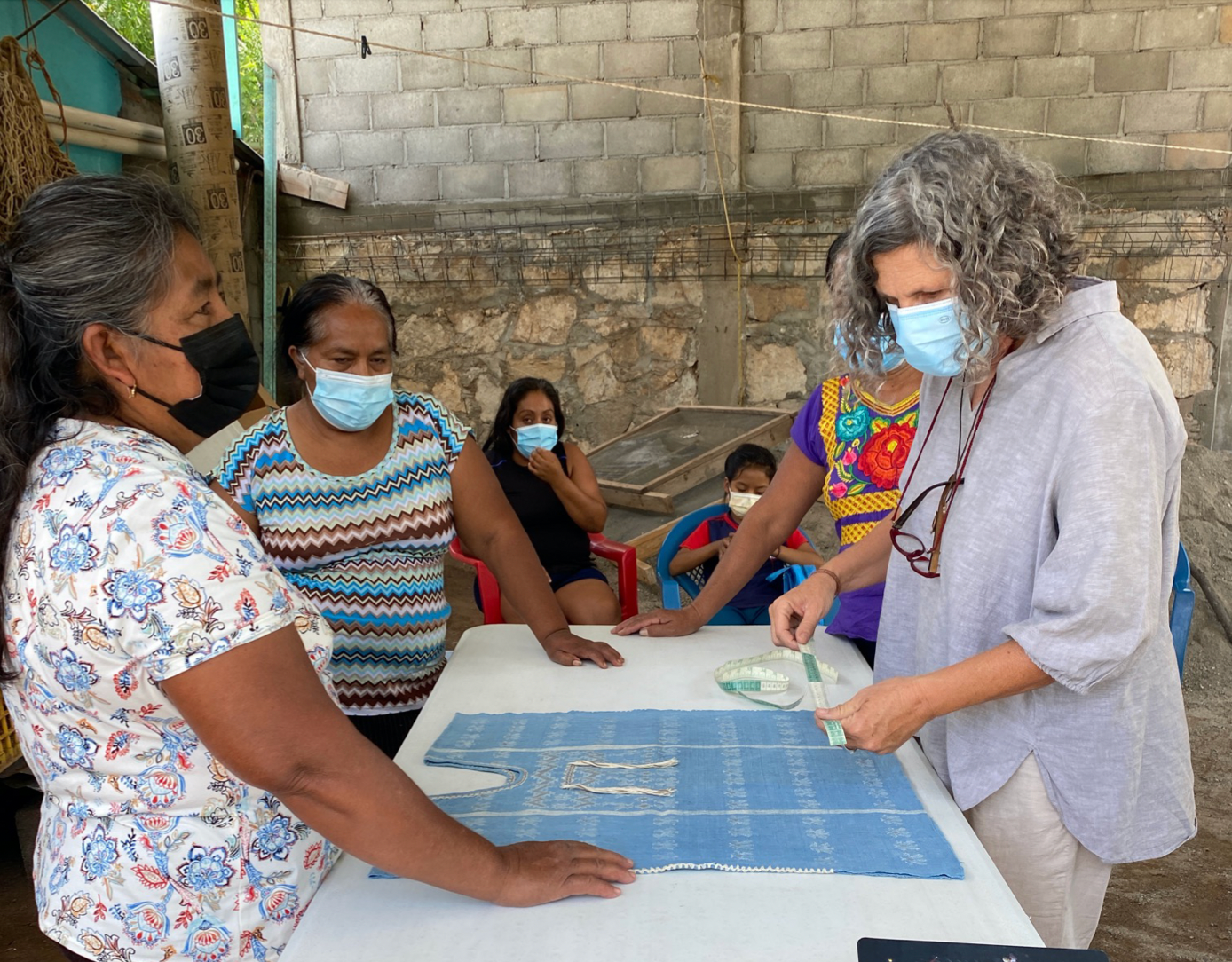Shipments from India to the US via international express mail have resumed with "delivery duty paid." We will cover the US tariff costs and keep our 2025 prices the same through the end of this year. Prices will increase in 2026 to cover the costs of US tariffs.
Shipments from India to the US via international express mail have resumed with "delivery duty paid." We will cover the US tariff costs and keep our 2025 prices the same through the end of this year. Prices will increase in 2026 to cover the costs of US tariffs.
A column with no settings can be used as a spacer
Link to your collections, sales and even external links
Add up to five columns
A column with no settings can be used as a spacer
Link to your collections, sales and even external links
Add up to five columns
A Special Alchemy of Color and Texture from Design Ateliers
November 18, 2022

This article first appeared in Impact Entrepreneur Magazine.
As part of a series of “fireside chats” sponsored by R.I.S.E. Artisan Fund, Hema Shroff Patel and Maddalena Forcella discussed their approach to design, heritage crafts, and their design studios. Both designers work collaboratively with highly skilled spinners, dyers, and weavers, and share a passion for the art and craft of textiles, sustainability, and improving the quality of life in their communities. Shroff Patel, founder of Amba, joined the conversation from Mumbai, India, while Forcella, founder of Madda Studio, spoke from Oaxaca, in the highlands of southern Mexico.
By combining contemporary design with highly skilled, weaving techniques, Amba and Madda Studio elevate craftmanship and the artisans behind it to create sophisticated, contemporary textiles for fashion and interior design.
Amba began after Hema Shroff Patel first visited Maheshwar at the invitation of Sally Holkar, founder of WomenWeave. She was inspired by Maheshwar’s setting, unique history and people, particularly the town’s community of talented weavers. Shroff Patel described how she combined her passion for art and design with the mastery of the local artisans to form Amba, a “bespoke micro-label…,” in 1999.
Madda Studio, co-founded by Maddalena Forcella and Marie Farneth, draws on Forcella’s deep design experience collaborating with indigenous women weavers in southern Mexico for over 25 years.
Madda Studio works with indigenous women spinners in the highlands of Chiapas and weavers from both Chiapas and Teotitlan del Valle, Oaxaca. Forcella explained how she marries the skill of these weavers with her own eye for design to create unique rugs and other products for the luxury interior design market.
“At Madda Studio, we like to talk about projects rather than products,” said Forcella, referencing how the studio presents its work. “The textile work we produce is the artifact of relationships, history, and culture that contributes to the making of each piece.”
“From sheep to spindle to showroom floor, the process of creation brings forth the innate beauty of handspun wool, natural dyes, and innovative uses of traditional weaving and felting techniques,” as the studio’s website describes this work.
Though rough in texture, the rugs and other pieces in the Madda Studio collection achieve a level of refinement suitable for high-end interior design. “I like a simple and essential aesthetic. I look for a delicate balance in my composition, letting the beauty of the material and color come to light,” Forcella said, trying to describe her design vision. To be sure, the word “simple” does no justice to Madda Studio’s subtly complex and carefully constructed pieces.
Similarly, Amba creates textile collections inspired by design sources as diverse as the Art Deco buildings of Mumbai and the minimalist art of Agnes Martin, best known for her deceivingly simple, yet highly complex paintings of lines and grids. Although a textile collection based on the artwork of Agnes Martin is not what anyone would expect to find emerging from the centuries-old weaving center of Maheshwar, the modernist designs proved to be perfectly suited to the mathematics of the warp and weft on the loom, and something entirely new was born.
The sophisticated textile collections created and crafted by Amba would be at home in a Paris fashion show or framed in a gallery, and indeed, as Shroff Patel explained, sometimes it is difficult to know which would be more appropriate. In addition to this artistic exploration and collaboration with highly skilled craftsmen, Amba has had a profound impact on the local community in its approach to business and its role in the community. Amba shares profits directly with its artisans, acknowledging their co-ownership in the studio’s creations. The studio also has a role in delivering much needed health services to the community.
Amba hosts “eye camps” bringing medical professionals to examine and treat people in the community. Dozens of people who depend on their eyesight to work effectively, receive corrective eyeglasses and dozens more are checked and treated for any eye problems. And in response to high rates of diabetes in India, Amba has sponsored “health camps” bringing doctors and nutrition specialists to meet with and treat members of the local community.
While many designers aim to grow their studios exponentially and expand their brand globally, Amba and Madda Studio have embraced a different strategy. These studios have engaged deeply in the communities and craft, operating as “ateliers” in a very elevated and sophisticated way. Both founders have a clear vision of what they want next for their studios as they seek values-aligned investors to support their growth in measured and strategic ways to deepen their impact.
Madda Studio aims to create a center for wool processing in Chiapas, a space with a carding machine that cleans the wool automatically and prepares it for spinning. Wool processing is never easy but can be especially difficult, Forcella explained, because the bulk material is particularly raw — dirty, rough, and heavy.
“The impact on the community would be huge, I think,” Forcella explained. “It would allow the women to dedicate their time to the most beautiful part of the process — spinning — rather than spending all that time cleaning and carding the wool.” The processing center would allow the women to earn more with less effort.
Amba is also seeking investment in the continued security and stability of the enterprise. “We turn 25 years old in 2024,” Shroff Patel said. “I dream of being able to hand this small social enterprise over to a young designer with a healthy bank balance.” Additionally, Shroff Patel wants to showcase Amba’s unique profit-sharing model to spread its positive impact to artisans beyond the local region. “It could definitely lead as an example in most craft clusters,” she said.
Through thoughtful design practices and long-term collaboration, Hema Shroff Patel and Maddalena Forcella have had a profound and sustainable impact in the communities where they work. By combining the seemingly opposing forces of contemporary art and traditional handweaving with such dexterity, they have created something greater than the sum of its parts. Not just anyone can succeed with this business model as its success depends on marrying a very sophisticated design sensibility with a compassionate commitment to community for a special alchemy of color and texture to produce refined works of beauty.
The R.I.S.E. Artisan Fund invests in early-stage artisan enterprises creating sustainable livelihoods for rural communities with few economic alternatives. The fund deploys capital using a range of investment vehicles from grants to revenue-based debt and equity investments while seeking a return of capital for further investment, thus creating a reinvestment cycle that multiplies the catalytic impact of philanthropic capital.
To invest via the R.I.S.E. Artisan Fund, you can make a tax-deductible contribution directly or via a grant from your donor advised fund (DAF). You can also co-invest directly in select investment opportunities. Contact ellen@sproutenterprise.net for more information or complete our Philanthropic Investment Grant Form to invest in the fund.
